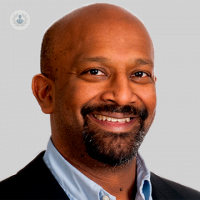What happens during thyroid surgery?
Escrito por:If you need to have the thyroid removed, it is important that the procedure is performed by an experienced surgeon, who regularly carries out the operation. Leading London otolaryngologist Mr Ram Moorthy shares his expert knowledge on what happens on the day of thyroid surgery and the recovery period afterwards…

What happens during the procedure for thyroid removal?
You will normally be admitted on the day of the procedure, where you will meet the surgeon and confirm the procedure as they answer any questions that you may have.
Thyroid surgery is performed under a general anaesthetic so you will also meet the anaesthetist who will discuss the general anaesthetic in more detail.
Once anaesthetised, the surgeon will make a small incision (about 4cm) on the front of the neck. This will allow them to remove either half or all the thyroid gland. If the thyroid gland is very large, then a drain (a small length of plastic tubing) may be placed, usually for 24 hours. The incision is closed with stitches, which will need to be removed about a week later. Some surgeons may use a dissolvable stitch, staples or skin glue.
You are able to eat and drink once you are awake but you may have a sore throat, which is usually related to the anaesthetic tube. Regular painkillers will be prescribed and you will be allowed to mobilise.
If you have had the whole of the thyroid gland removed your calcium levels will be monitored. The four parathyroid glands, which control calcium levels, can be damaged during thyroid surgery and cause levels to fall. If this happens there will be a need to start calcium supplements.
If you have had a hemithyroidectomy then you will usually be discharged the following day. If you have had a total thyroidectomy you will be able to go home once the calcium levels are stable. Patients who have undergone a total thyroidectomy will also be started on Thyroxine (thyroid hormone) medication.
What aftercare is needed following thyroid surgery?
Patients will spend at least one night in the hospital and require approximately two weeks at home to recover. Regular analgesia will be required and exercises will also be provided.
If a total thyroidectomy has been performed you will be prescribed Thyroxine, which will need to be continued lifelong. As described above you may also require calcium supplements, which is usually temporary but in some cases can be permanent. Regular blood tests will be undertaken to determine the correct dosage of the Thyroxine and if the calcium supplements need to continue or not.
If a removable suture or staples have been used to close the skin these will need to be removed approximately 5-7 days later.
The surgeon will typically see the patients approximately two weeks after the op to ensure that the wound is healing and confirm that there has been no problem with the voice. An examination of the voice box (flexible nasoendoscopy) will be performed to confirm that the vocal cords are moving normally.
The surgeon will also discuss the report of the examination of the removed thyroid under the microscope by a pathologist. They will explain if any further treatment is required or if there is a need for follow-up appointments.
Will thyroid surgery affect my voice?
It is uncommon for thyroid surgery to affect the voice. There are two nerves that control the voice box, which is near the thyroid gland. The main nerve is the recurrent laryngeal nerve and then there is the smaller superior laryngeal nerve. Some surgeons, including myself, use a nerve monitor during surgery to assist with identifying and reducing the risk of damaging the nerves. We can also use magnifying glasses (loupes) to assist with identifying and preserving the nerves.
The superior laryngeal nerve is preserved by meticulous surgical technique and if damaged can cause an altered pitch and impact on the projection of the voice, this can be helped by speech therapy.
The recurrent laryngeal nerve is identified and preserved during surgery. Damage can lead to paralysis of the vocal cord causing a hoarse and weak voice. The injury is typically temporary and will recover, which can take a few weeks to a few months. Rarely injury may be permanent. Speech therapy can help with recovery and occasionally further surgery may be required.



